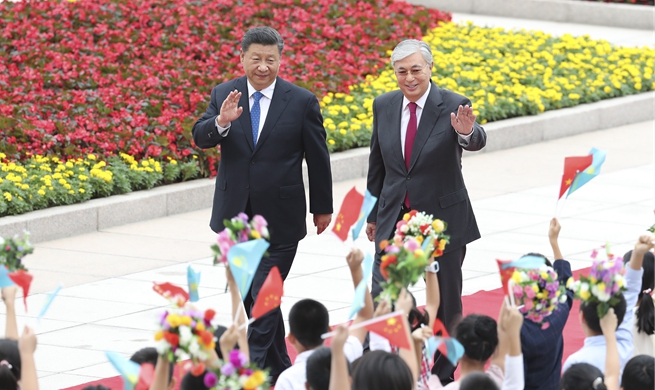by Marwa Yahya
CAIRO, Sept. 12 (Xinhua) -- The continuous decline in Egypt's inflation in July and August could be the biggest push to cut interest rates in Egypt's banking system, said analysts.
The Central Agency for Public Mobilization and Statistics (CAPMAS) said that Egypt's annual consumer price inflation declined to 6.7 percent in August, compared with 13.6 percent in the same month in 2018, the lowest level since 2013.
Prices rose 0.7 percent last month compared with 1.8 percent in July, according to the CAPMAS's report.
"The slowdown in inflation rates is a key gain for the banking sector," said Hisham Ibrahim, professor of funding and investment in Cairo University.
On Aug. 22, the Monetary Policy Committee of the Central Bank of Egypt (CBE) cut the overnight deposit rate, the overnight lending rate, and the rate of the main operation to be at 14.25 percent, 15.25 percent, and 14.75 percent, respectively, higher than economists' expectations.
The CBE's decision was the first of its kind since February and the first sharp reduction since liberation of the currency rate in November 2016.
"Decline of local currency exchange rate against the U.S. dollar and the tendency to reduce interest rates have led to slight cut in some prices, which caused the inflation to continue declining," Ibrahim told Xinhua.
He predicted inflation will continue coming down in the second half of the year and the central bank will continue to use that as a window to ease rates.
"I expect the interest rates to decline by 2 percent by the end of the current year due to the big gap between the inflation rates and the interest rate," he argued.
However, the CBE said last month that future decisions remain "a function of inflation expectations, rather than prevailing inflation rates."
The economic expert reiterated inflation is expected to continue to decline until next January.
He said the interest rates decline will positively impact the reduction of production costs and result in prices decline, which will ease citizen's daily life conditions.
Waleed Gab-Allah, professor of financial and economic jurisdictions at Cairo University, agreed that the decline of both inflation and future interest "will keep Egypt attractive to foreign investors seeking good revenues from pumping money into short-term debt."
The investor activities will increase, which will open doors for creation of job opportunities, Gad-Allah said.
He explained the real interest rate is "still strong compared with other emerging-market economies."
Gad-Allah also expected the inflation rates to take fluctuated course with dropping average, calling on the government to inject the markets with more commodities in reasonable prices to prevent market speculations.
He termed the decline on the inflation rates as "a normal result of the economic reform program" that led to decline in the public budget, increase in exports and taxes along with improvement in expenditure behavior.
Supported by a 12-billion-dollar loan from the International Monetary Fund (IMF), Egypt started a three-year austerity-based economic reform program in November 2016, including local currency devaluation, fuel and energy subsidy cuts and introduction of value-added tax.
Despite consequent price hikes, the reform program achieved positive results that reflected on the country's growth rate, which hit 5.6 percent during the 2018/19 fiscal year that ended in late June, according to Egypt's Finance Minister Mohamed Maait's remarks on Monday.
The minister attributed the rise of the growth rate to a decline in the unemployment rate.
He said budget deficit hit 8.2 percent of the GDP compared with 16.5 percent in 2013/14, expecting it to continue to decrease to 7.2 percent in 2019/20.
The IMF expects Egypt's foreign debts to decline to 88 billion dollars by 2022 as a result of economic reform.













